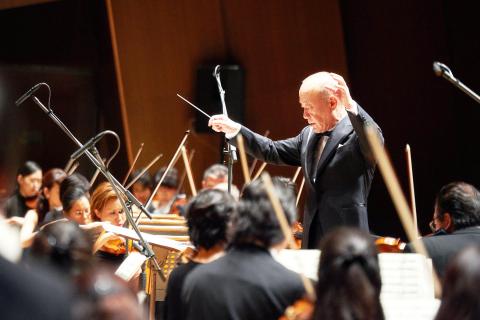Garbage trucks on Saturday inadvertently disrupted a performance by the New Japan Philharmonic World Dream Orchestra in the National Taiwan University Sports Center when they started loudly playing prerecorded tunes that signal waste collection, sparking outrage from classical music fans attending the event.
The internationally renowned orchestra was performing in the sports center when the trucks came to collect trash and recycling, playing music that twice disrupted musicians, sources said.
City garbage trucks play Ludwig van Beethoven’s Fur Elise and Tekla Badarzewska-Baranowska’s A Maiden’s Prayer at each collection stop to alert residents of collection times.

Photo courtesy of BigArt
The truck music reportedly surprised conductor Joe Hisaishi, who looked around the venue for its source before giving up and waiting for the tune to finish. He then smiled and gave a polite bow in its general direction before resuming the performance, a gesture that earned him applause from the audience.
However, netizens flooded the Facebook page of BigArt, the concert’s organizer, with angry posts, saying the company showed no regard for acoustics while selecting the venue and failed to anticipate the scheduled garbage collection, which showed no respect to ticket-buyers or performers.
“They lost our face to the world,” one netizen said.
“Now I have listened to garbage trucks for the first time during a concert; I will remember this for the rest of my life,” another said.
BigArt said the acoustic problems and the arrival of garbage trucks between 8pm and 9:10pm were known to Japanese organizers, and they had tried adjusting the schedule, but withheld the information from the musicians to “avoid affecting their performance.”
BigArt said that it had told Japanese organizers that the National Theater and Concert Hall were unavailable, and the orchestra said that background noises should not cause problems.
It said that Hisaishi asked staff members about the noise in a curious way and joked about it after the performance.
BigArt said that it accepts public criticisms and would use them to improve its conduct.
Formal concerts are usually performed at professional venues, but even purpose-built concert halls could be overwhelmed by unwanted noise, National Taiwan Symphony Orchestra chief of marketing and planning Huang Fu-ming (黃馥茗) said.
Huang said a performance by the symphony orchestra was once interrupted by fireworks near a venue, adding that such situations can only be averted by coordinating with city authorities and organizers of other events.
Universal Music Taiwan Ltd director of jazz and classical music Bernard Fu (傅慶良) said the sports center is not designed to host musical performances and coordination is necessary if a orchestra performs at the venue.
“The concert could have taken place on days when there are no garbage collection, like Wednesdays or Sundays, or they could have asked trucks not to play music when they were in the neighborhood,” Fu said.
Fu added that the incident is unusual because in Taiwan, complaints are typically made by local residents against the concert organizers and performers, citing the example of pop singer A-mei’s (張惠妹) concert at the Taipei Arena last year.
Additional reporting by Kuo An-chia

Alain Robert, known as the "French Spider-Man," praised Alex Honnold as exceptionally well-prepared after the US climber completed a free solo ascent of Taipei 101 yesterday. Robert said Honnold's ascent of the 508m-tall skyscraper in just more than one-and-a-half hours without using safety ropes or equipment was a remarkable achievement. "This is my life," he said in an interview conducted in French, adding that he liked the feeling of being "on the edge of danger." The 63-year-old Frenchman climbed Taipei 101 using ropes in December 2004, taking about four hours to reach the top. On a one-to-10 scale of difficulty, Robert said Taipei 101

Nipah virus infection is to be officially listed as a category 5 notifiable infectious disease in Taiwan in March, while clinical treatment guidelines are being formulated, the Centers for Disease Control (CDC) said yesterday. With Nipah infections being reported in other countries and considering its relatively high fatality rate, the centers on Jan. 16 announced that it would be listed as a notifiable infectious disease to bolster the nation’s systematic early warning system and increase public awareness, the CDC said. Bangladesh reported four fatal cases last year in separate districts, with three linked to raw date palm sap consumption, CDC Epidemic Intelligence

US climber Alex Honnold left Taiwan this morning a day after completing a free-solo ascent of Taipei 101, a feat that drew cheers from onlookers and gained widespread international attention. Honnold yesterday scaled the 101-story skyscraper without a rope or safety harness. The climb — the highest urban free-solo ascent ever attempted — took just more than 90 minutes and was streamed live on Netflix. It was covered by major international news outlets including CNN, the New York Times, the Guardian and the Wall Street Journal. As Honnold prepared to leave Taiwan today, he attracted a crowd when he and his wife, Sanni,

Taiwanese and US defense groups are collaborating to introduce deployable, semi-autonomous manufacturing systems for drones and components in a boost to the nation’s supply chain resilience. Taiwan’s G-Tech Optroelectronics Corp subsidiary GTOC and the US’ Aerkomm Inc on Friday announced an agreement with fellow US-based Firestorm Lab to adopt the latter’s xCell, a technology featuring 3D printers fitted in 6.1m container units. The systems enable aerial platforms and parts to be produced in high volumes from dispersed nodes capable of rapid redeployment, to minimize the risk of enemy strikes and to meet field requirements, they said. Firestorm chief technology officer Ian Muceus said